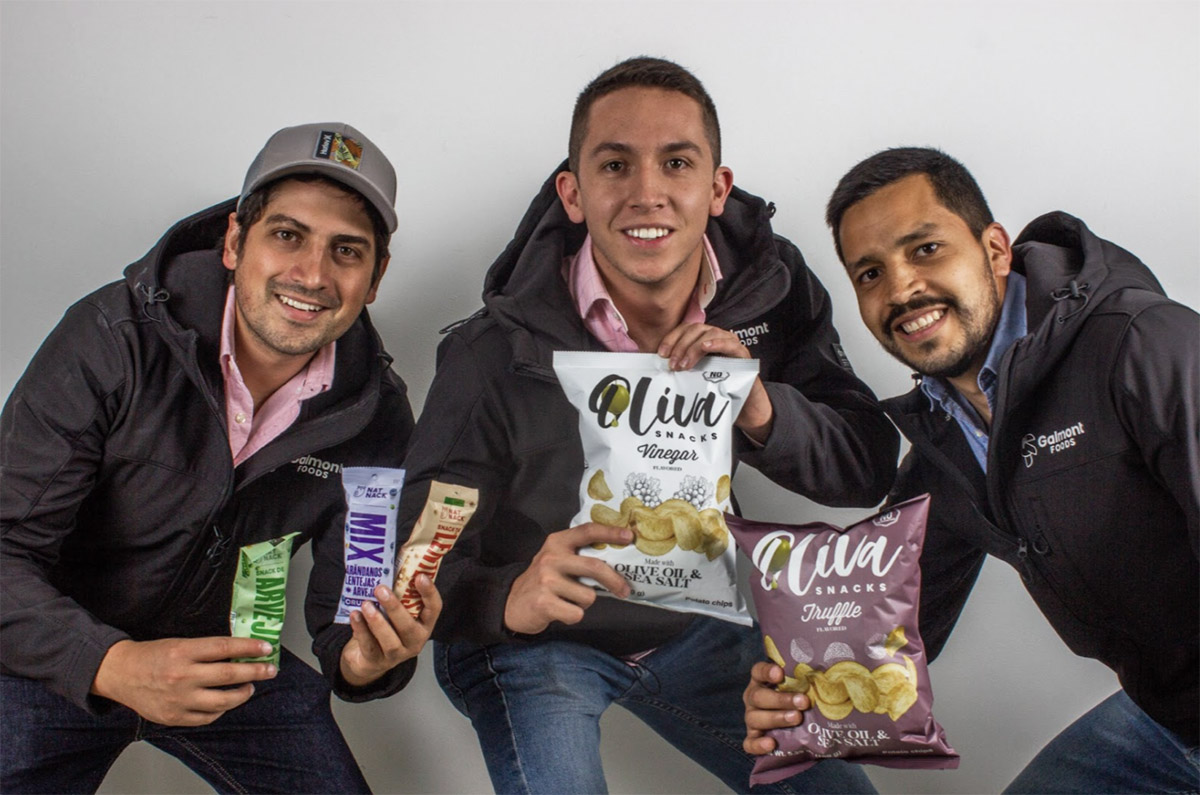April 5, 2022


Galmont Foods is a joint venture into the world of healthy snacks, founded by Colombians Sebastian Montoya and Sebastian Galvez. Luke Wilkinson spoke with Sebastian Montoya about his pulse-based snack brand Nat Nack, the egalitarian nature of pulses and how healthier habits can fight rampant obesity in Colombia.
It's a bit of a long story with its ups and downs but it began with my father who ran a company called Mister Snacks that produced and distributed pork rinds. A couple of years ago my father died and, after his death, my family wanted to close the business but instead I decided to take the reins and try to run it myself.
Soon enough, I got a good picture of the company: the numbers I was dealing with and how it all worked. I consumed every little detail of the business. I started to get in contact with some of my father's friends who also had companies in the snack industry, and through them I found my business partner, Sebastian Galvez, who is the owner of the brand Oliva Snacks, one of our brands under the Galmont Foods umbrella.
Then we realized that between the two businesses we had the infrastructure necessary to start developing and producing a health snack. So, I set up Nat Nack. When we finally developed the product, we absolutely loved it. We started figuring out what we might need to invest, and the marketing, then we joined the two companies together to create Galmont Foods.
That first year, each of us ran our own companies separately, both offering the products of the other. Then, last year, we were looking for a way to expand our portfolio and a friend mentioned that one of the bigger retailers had come to him looking to make their own healthy snacks from pulses. That's where everything got started.
We specialize in ensuring that our snacks contain a minimal amount of ingredients and that those that we do have are natural and healthy. We want to make things as clean as possible by using only natural flavorings and only three ingredients. A majority of the other products in the market use many more ingredients as well as preservatives that have a negative impact on people’s health.
That said, the market is still really quite small for these kinds of snacks, and there are very few companies in Colombia and South America in general who are making them. Pulse-based snacks are still a bit of a shock for people here!

Colombia isn't really a producer of pulses so all the pulses we use are imported from different producers - we buy them through a wholesaler, so they come from all over. Much of it is from India. We work with lentils, chickpeas and green peas, all chosen because approximately 90% of all Colombians consume at least one of these pulses on a weekly basis. It's a staple food with really high levels of consumption among people of all different socio-economic backgrounds. In the end, the main reason we chose pulses is the nutritional value they bring to products – they have high levels of protein, iron, fiber and vitamins. They’re an essential part of any diet, and ideal if you’re vegan or coeliac.
The only barrier we've had to break through is the one between what constitutes lunch and what constitutes a snack. Pulses in snack format sometimes spook people but, once they try it, they realize that they're delicious, healthy and an ideal substitute for peanuts. All the pulses we use are well-known and widely consumed all around the world so they are marketable internationally.
Our most popular product is the mix bar, which contains lentils, green peas and blueberries and has a lemon flavor.
We’ve found that people use them for different things: young people tend to eat our products as if they were a snack but my mom and her generation break them up and use them as an addition to salads to add a bit of extra crunch!
I think it was mostly trial and error. Pulses are a very versatile product, and we just started adding in some flavorings to see what happened – we tried wasabi, Sriracha - as I say, trial and error, keeping in mind the tastes of the consumer. In Colombia we have a set group of flavors that you find more often than not in snacks: salted is one, spicy, and then you have a lemon flavor, which is extremely popular here but not so much in Europe and the USA. We decided to start with the flavors that we knew would work and then see how things go.
Actually, in the next couple of months we’re going to bring out a sweet version. We're going to call it the “Choco-Garbanzo” (Choco-Chickpea) and it will be a chickpea bar with a light covering of chocolate. As well as that, we're going to have chickpeas covered with honey, and also lentils covered with honey and sesame seeds which will be another mix. They’re really tasty, I have a feeling they're going to be a big success!
Initially, due to when we started production last year, we were unable to put our products straight into the national market, because the big chains and supermarkets don't take on new products between November and December. Right now, our product is sold via a chain called Ara, part of Jeronimo Martins, a Portuguese multinational who have facilitated the sale of a product at the national level. We have 500 different points of sale with them and we have also started selling via Cencosud, better known as Jumbo, one of Colombia’s biggest supermarkets.
We are expanding as much as we can as quickly as we can and into the biggest supermarkets possible. There aren't that many big supermarkets here but everything is now approved and ready to be further distributed at a national scale. Internationally, we're already in the process of taking products to Ecuador, Peru, Brazil and also Florida in the US.
People have got in touch with us internationally to make orders, from South Korea to the UAE. I've sent packages to Europe and Canada, too. So we are knocking on the door of different countries - we would even consider moving production to Spain or another European country in order to make our product there in line with EU requirements.
I tend to say that, in terms of consumption habits, the Colombian market mirrors what happens in America and Europe but with a delay of a few years. Healthy snacks are just now arriving in Colombia but the fact that some of the bigger chains are betting on an increased demand for these kinds of products is exactly what has allowed us to begin expanding and distributing so quickly at a national level.
It's still a niche market but it's definitely growing rapidly - Covid accelerated things by making people more health-conscious and pay more attention to the things they eat. As a strategy, we are looking to export more than we are looking at the internal market, because things here are still very very niche.
At a government level, I would go as far as to say probably not as there are so many other problems around the country that obesity isn't high up on their agenda. What I can say is that obesity is a pandemic that no one is trying to treat. There is an organization called Red Papaz, which works mostly in primary schools in order to improve the diets of the children who attend them. They’ve achieved some great things: removing carbonated drinks from the canteens and substituting the traditional unhealthy snacks for newer, healthier ones, for example. We’ve started working with them so that they're able to bring us along with them to schools whenever they need us.
They're a great organization who are constantly trying to battle against the big drinks companies who sell carbonated drinks and products with huge quantities of sugar. The campaign against sugar is their biggest focus.
The main change I would like to see for the industry would be better, more balanced products than the ones that exist right now. It is the larger companies who need to make changes to their product lines so that they’re part of creating a better diet for consumers. They also have a huge role to play in education – often I find myself in conversations with people within our company and we realize that we, too, are responsible for making sure that people eat less sugar and eat more healthily. There should be a more public social responsibility among the companies who make food, just as much as there should be among alcoholic drinks companies.

Sebastian Montoya / pulse-based snacks / Galmont Foods / Sebastian Galvez / Nat Nack / Colombia / lentils / chickpeas / reen peas
Disclaimer: The opinions or views expressed in this publication are those of the authors or quoted persons. They do not purport to reflect the opinions or views of the Global Pulse Confederation or its members.